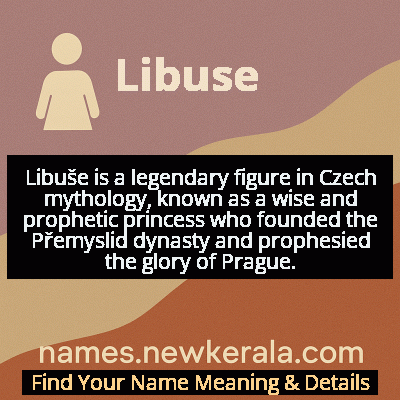Libuse Name Meaning & Details
Origin, Popularity, Numerology Analysis & Name Meaning of Libuse
Discover the origin, meaning, and cultural significance of the name LIBUSE. Delve into its historical roots and explore the lasting impact it has had on communities and traditions.
Name
Libuse
Gender
Female
Origin
Czechoslovakian
Lucky Number
5
Meaning of the Name - Libuse
Libuše is a legendary figure in Czech mythology, known as a wise and prophetic princess who founded the Přemyslid dynasty and prophesied the glory of Prague.
Libuse - Complete Numerology Analysis
Your Numerology Number
Based on Pythagorean Numerology System
Ruling Planet
Mercury
Positive Nature
Adventurous, dynamic, curious, and social.
Negative Traits
Restless, impatient, inconsistent, prone to indulgence.
Lucky Colours
Green, white.
Lucky Days
Wednesday.
Lucky Stones
Emerald.
Harmony Numbers
1, 3, 9.
Best Suited Professions
Sales, marketing, travel, entertainment.
What People Like About You
Versatility, charisma, adventurous spirit.
Famous People Named Libuse
Libuše Šafránková
Actress
Iconic role as Popelka in 'Three Wishes for Cinderella', one of Czechoslovakia's most beloved films
Libuše Moníková
Writer
Award-winning Czech-German novelist exploring themes of Czech identity and history
Libuše Průšová
Tennis Player
Professional tennis player achieving WTA rankings in international competitions
Libuše Havelková
Actress
Thalia Award-winning actress with extensive theater and film career spanning decades
Name Variations & International Equivalents
Click on blue names to explore their detailed meanings. Gray names with will be available soon.
Cultural & Historical Significance
The Libuše legend has been instrumental in shaping Czech national identity through centuries of foreign rule. During the Czech National Revival of the 19th century, her story gained renewed importance as intellectuals sought to reconstruct Czech history and culture. Bedřich Smetana's opera 'Libuše' premiered in 1881 for the opening of the National Theatre, cementing her status as a national symbol. The legend embodies themes of feminine wisdom, national destiny, and the connection between rulers and the land they govern. Even today, Libuše represents the ideal of wise, compassionate leadership and the enduring power of Czech cultural heritage.
Extended Personality Analysis
Women named Libuše typically exhibit a remarkable blend of intuition, wisdom, and practical leadership. Drawing from the legendary queen's attributes, they often possess strong visionary qualities and the ability to see patterns and possibilities that others miss. Their decision-making combines emotional intelligence with rational analysis, making them excellent mediators and problem-solvers. Many demonstrate a natural authority that comes from competence rather than aggression, often becoming respected figures in their professional and personal circles.
Libuše's personality often includes deep cultural awareness and appreciation for tradition, though they typically balance this with progressive thinking. They tend to be excellent communicators, particularly in situations requiring diplomacy or cultural sensitivity. Their creative talents frequently manifest in arts, education, or community leadership. While they can be private about their inner world, they form deep, lasting relationships based on mutual respect and understanding. The name carries an expectation of integrity and wisdom that most bearers naturally grow into, often developing a strong sense of responsibility toward their community or family legacy.
Modern Usage & Popularity
In contemporary Czech society, Libuše maintains its status as a classic traditional name, though its popularity has fluctuated significantly over generations. According to the Czech Statistical Office, the name experienced its peak popularity between 1940-1960, reflecting post-war interest in national traditions. Currently, it's considered a somewhat rare choice, often selected by parents seeking meaningful connections to Czech heritage rather than following naming trends. The name appears more frequently in historical regions like Central Bohemia, where the Libuše legend remains particularly resonant. Modern usage often involves combining it with more contemporary middle names to balance tradition and modernity. Interestingly, the name has seen slight increases during periods of national celebration or anniversaries related to Czech statehood. Among Czech diaspora communities, Libuše serves as a powerful cultural marker, helping maintain connections to ancestral roots while adapting to multicultural environments.
Symbolic & Spiritual Meanings
The name Libuše carries profound symbolic weight as an archetype of feminine sovereignty and national foundation. It represents the concept of 'seeing beyond' – both in terms of prophetic vision and the ability to perceive deeper truths beneath surface appearances. Symbolically, it connects to themes of cultural memory, as Libuše serves as a living link between ancient Slavic traditions and modern Czech identity. The name embodies the principle that true leadership emerges from wisdom and connection to the land rather than mere power or inheritance.
In psychological terms, Libuše symbolizes the integration of intuitive and rational faculties, representing wholeness and balanced judgment. The legendary marriage between Libuše and Přemysl symbolizes the necessary union between visionary leadership and practical implementation. The name also carries environmental symbolism, reflecting the deep connection between rulers and their territory in Slavic worldview. For contemporary bearers, the name often becomes a personal symbol of cultural continuity, feminine strength, and the enduring power of stories to shape both individual identity and collective destiny.

